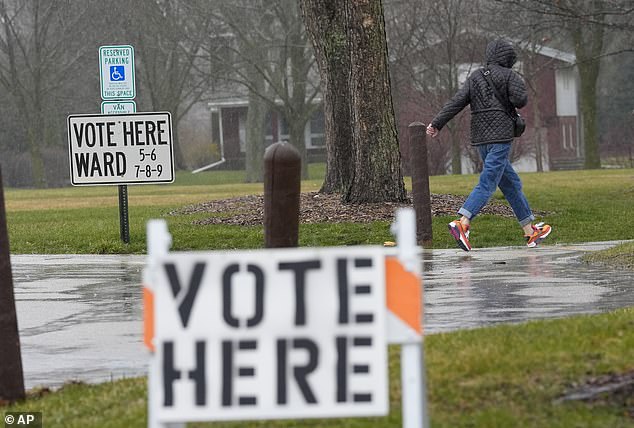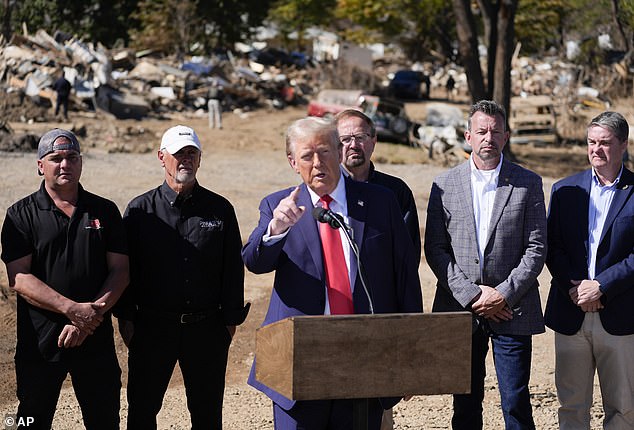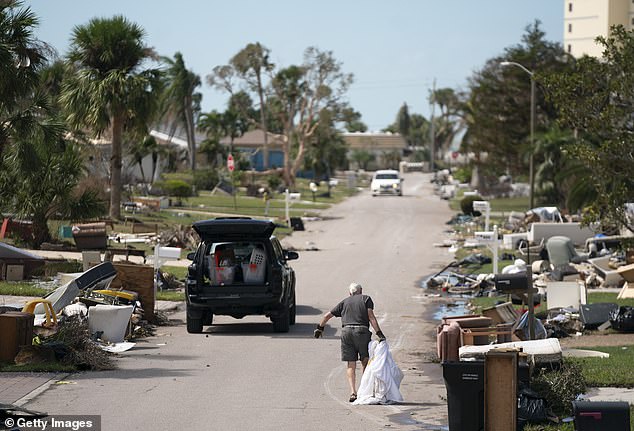Meteorologists reveal how the weather could sway the presidential election
In less than two weeks, Americans will decide whether Vice President Kamala Harris will become the first female president or whether former President Trump will win a second term.
But experts say another factor will play a big role in this decision: the weather.
In the wake of Hurricanes Helene and Milton, which devastated the East Coast from Florida to Virginia, many voters are still in recovery mode and may not be able to go to the polls.
Helene’s devastating impact on the swing state of North Carolina could have an especially strong influence on the election, political strategist Bradley Trunk told DailyMail.com.
“North Carolina is one of seven states that will determine who will be the next president of the United States,” he said. “You really can’t have much higher stakes than this.”
Elsewhere in the U.S., even an average rainfall could have a significant impact on voter turnout and mood, Trunk said.
Research has shown that rainfall has a negative impact on voter turnout. One study estimates that for every inch of rain that falls on voting day, turnout drops by 0.95 percentage points.
Research has shown that rainfall has a negative impact on voter turnout. One study estimates that for every inch of rain that falls on voting day, turnout drops by 0.95 percentage points
While that may seem like an incremental impact, heavy rains or extreme weather in a swing state could theoretically reduce turnout significantly enough to change the outcome of an election.
A rainy day can also cause a bad mood. When an undecided voter goes to the polls feeling pessimistic, he may be more inclined to vote for a candidate whose campaign is based on doom and gloom, Trunk said.
He claims that Trump’s campaign strategy falls into that pessimistic category, while Harris’ message is about optimism and hope for the future.
Therefore, “If you went to the polling station on a miserable day and you were really undecided, from a purely subconscious standpoint that would be demonstrably in Trump’s favor,” he said.
In fact, it’s a general rule of thumb that rain benefits the Republican ticket, Trunk said. But that’s not because all Republicans are running pessimistic presidential campaigns.
“Lower turnout works better for Republicans,” Trunk said.
That’s because more people tend to vote for Democrats — which is also why the party sometimes wins the popular vote but not the electoral vote, he explained.
Some experts believe that voting day conditions have influenced elections before, although this is less fact than political knowledge, Trunk warns.
During the 1960 election, when John F. Kennedy defeated Richard Nixon, voting day in the US was bright and sunny. Some experts speculate that this gave the Democratic ticket an advantage.

Rain can cause a bad mood. When undecided voters go to the polls feeling pessimistic, they may be more inclined to vote for a candidate whose campaign is based on doom and gloom.
And in 2000, when George W. Bush ran against Al Gore, election day was rainy in Florida, the deciding state for this election.
Bad weather lowered turnout in some Gore elections, such as Pensacola. This may have played a role in securing the presidency for Bush.
But the US is huge, and the weather varies widely across the country on any given day. So how can local weather conditions affect an entire election?
“Ultimately, that’s because of the Electoral College,” Trunk explained.
‘The US does not determine the president based on who wins the most votes. “It determines who wins with 270 Electoral College votes allocated by the state,” he said.
Election Day weather in the seven swing states — Pennsylvania, Georgia, North Carolina, Michigan, Arizona, Wisconsin and Nevada — is really “the only weather that matters,” he said.
That’s why Hurricane Helene could play a key role in this election.

Republican presidential candidate, former President Donald Trump, visited North Carolina in the aftermath of Hurricane Helene. This storm could have a strong impact on the 2024 elections
The storm made landfall on September 26 as a Category 4 hurricane.
Of the six southeastern states affected, North Carolina bore the brunt of the devastation and also happens to be the only swing state affected.
About half of the total deaths occurred in North Carolina, which was lashed by torrential rains, widespread flooding and high winds.
State officials have reported 96 deaths from the storm, and estimate that Helene caused at least $53 billion in damage and recovery needs.
As North Carolina residents clear the pieces of their homes, it’s safe to assume this will have a negative effect on election turnout, although this remains to be seen, Trunk said.
But how will the weather on Election Day affect the US vote?
Paul Pastelok, AccuWeather’s chief weather expert, gave DailyMail.com a preliminary forecast for Election Day across the country.

As North Carolina residents clear the pieces of their homes and communities, it’s safe to assume this will have a negative impact on voter turnout, although this remains to be seen.
It appears the Northeast, Great Plains and Southwest regions will have mild and dry weather on Nov. 5, he said.
But in other parts of the US, voting conditions could be less than ideal.
There is a risk of showers and thunderstorms from the Mississippi Valley to the Appalachians, and storms could become severe in the Tennessee Valley, midway between the Mississippi Valley and the lower Ohio Valley, Pastelok said.
Houston, Chicago, southeast Georgia and parts of Florida can also expect rain on Election Day.
As for the risk of extreme weather, Pastelok will be watching a potential tropical storm currently brewing in the Caribbean “very closely” – although it’s too early to say whether it will actually form or impact the USA
All these predictions are preliminary and subject to change.
The states expecting bad weather – Mississippi, Tennessee, Ohio, Texas and Illinois – tend to turn red, and rain generally gives the Republican ticket a boost in votes.
But as for whether this could sway the election in Trump’s favor, Trunk said it’s unlikely because none of these states are swing states.
Furthermore, these states typically vote red anyway, so a small Republican advantage in these locations will not shake up the election results.
But if that bad weather moves into North Carolina, “it could be meaningful,” Trunk said.
